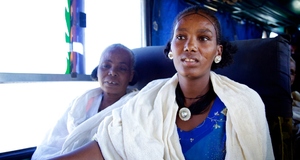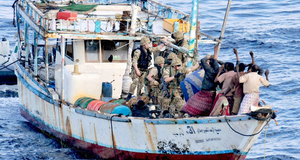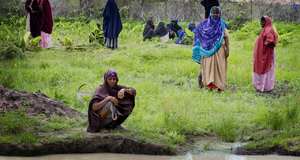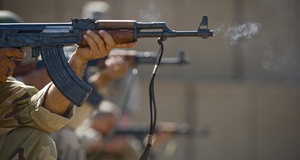Featured Article:The Horn of Africa: Critical Analysis of Conflict Management and Strategies for Success in the Horn's Future
By
2010, Vol. 2 No. 06 | pg. 6/6 | « CONCLUSIONS AND RECOMMENDATIONS: STRATEGIES FOR THE HORN'S FUTUREAs earlier noted, successful mediation must create an option that allows political space for peaceful disagreement as well as public accountability and representation. However, before new mediation strategies can be implemented or redesigned, past methods must be examined. One typical method of mediation that has been unsuccessful is “wait and see.” The point of such a policy is to ensure that national sovereignty is not impinged while reserving the international community for the direst of circumstances. Some conflicts cannot be resolved without a mutually intolerable stalemate, as earlier mentioned, and so observing parties must wait for the conflict to occur before a mutually satisfactory resolution can be implemented. However, this policy has only allowed for more actors to enter the conflict and complicate the mitigation process. Inhabitants of the Horn identify with warfare; violence is a cycle that the people are willing to tolerate. As a result, mutual stalemates rarely occur and bilateral solutions fail to be implemented. The Horn’s conflicts are dynamic. The region needs a strong regional actor but has none, and the international community has no legitimacy due to past debacles. The unwarranted invasion of Italy on behalf of Somalia into Ethiopia did not receive adequate action from the League of Nations, little more than paper resolutions were performed during the Ogaden conflicts as well as the Ethiopian-Eritrean clashes. The UN intervention in Somalia ended in disaster for the United States, and both the UN and U.S. left after thoroughly destroying any remaining legitimacy through a botched mission, little aid distribution success, and no establishment of a centralized government.What diplomatic, communicative strategies will help restore peace and stability in the region? What measures can each state take to mediate their conflicts successfully? Currently, mediation is considered zero-sum to these nations; successful conflict resolution is measured through military victory. These nations must be convinced that successful negotiation can result in positive-sum for each party involved. This is especially true of Somalia, where their politics are susceptible to centrifugal dynamics which are complicated by clan-based divisibility. This has made it difficult to maintain coalitions, and each faction believes its ends can only be furthered through violence. Peace itself may be considered positive-sum, but Somalis fear a loss of control that can lead to a central government dominated by a dictator such Barre. Such a proposition, then, is considered zero or negative-sum. Somalia’s problems fit within the protracted social conflict designation, described in Interactive Conflict Management by R.J. Fisher. Fisher elaborates that the protracted social conflict is an “enduring set of antagonistic perceptions between communal groups and the state” because of the lose-lose outcome. This most obviously results in the “deterioration of physical security, not simply because of violence but the very destruction of physical and social infrastructures” (1997 pp. 86-87). The erosion of these structures might have led to reduction of resources available for the various militias, and one might expect a stalemate to be created within Somalia. Such a stalemate might have resulted in civic reconciliation within the country, but the Somali crisis has not produced such a stalemate. Protraction of the conflict has continued to deepen divisions and add additional conflict dynamics that complicate the peace process. This leads to at least one constant throughout the Horn’s conflicts; ownership of the management and resolution process by the majority of the population, and not just among party powers, is critical. External mediation, particularly international intervention, has marginalized the legitimacy of the peaceful negotiation. Regional control remains divided amongst the Horn’s disagreeing factions. Identifying valid representatives and mediators between militia leaders, community leaders, and clan leaders remains difficult. However, the exclusion of any group during national peace conferences ultimately leads to hostility and undermines whatever transitional government is put in place. An effective hybrid system, not to be confused with power-sharing, must be established. The mediation process that occurred in Arta in 2000 demonstrated the possible success of such arbitration. The various clan leaders of the entire Puntland region wrote their approval to the UN Secretary General and Security Council Members: In principal we, the Puntland Diaspora communities, strongly support the Arta peace conference, not as a state reconstitution medium, but as a forum for an inter-communal political dialogue aimed to foster inter-communal trust and develop a shared understanding of the future - crucial missing ingredients for political progress in Somalia. We view the Arta medium not yet politically ripe and inclusive enough as a platform for state formation; it is too haste to aspire such goal at this stage of Somali political development (Puntland Position on Arta 2000). Unfortunately, support was retracted when an interim national government was formed and perceived as illegitimate by multiple groups. These groups were either excluded or shared the mentality of the Puntland communities, concluding that current leadership was not prepared to centralize Somali government. Because there were multiple claims to power and no legitimate function for selection of party leadership, various groups were convinced that any interim government was solely supported by the international community. This proposition was characteristically perceived as zero-sum because they feared it could allow for central leadership to develop into a regime similar to that of Barre’s. Before a successful central government can be established, the region must develop inter-communal trust and shared understanding via political discussion amongst vying parties. The fundamental distrust between faction leaders is not conducive to peaceful arbitration. If talks are held that focus on developing shared understanding between the groups, and not on establishing one group over the other, distrust can be lessened and competing groups can establish successful management internally amongst one another with the political space to disagree without necessitating violent disapproval. Equal power-sharing should not be encouraged, because the resultant peace is tenuous at best and often erupts into more volatile conflict when a party feels rebuffed, undermined, or lied to. Also, no entity has established an ability to lead the nation as a whole, and central government remains ineffective. Once level negotiations occur, the parties may establish representatives that together act as a central government without abolishing different groups or their respective aims. Important to the retention of each actor’s legitimacy is the opportunity to disagree without revolt. In many of these conflicts, political opposition has been dramatically stifled, all political interests besides that of the dominant leadership have been forbidden, and the resultant backlash was supported by violence. Again, the establishment of political space would lend more credibility to the leaders of the management process. Those disagreeing with the leadership could do so without destroying the proposition of peace. A similar option should be implemented between the Ethiopians and Eritreans. A peaceful forum comprised of community leaders between the nations should be created so that the general population can demand accountability of their leadership. They can do this through their communities; religious leaders, women’s and youth organizations, and figures of academia can help lead the nations through meaningful conflict management. Eventual resolution can occur through community assessment of the past, present, and potential futures of the nations and their respective parties. Additionally, these communities must encourage a cultural shift away from the acceptance of the militarized option in diplomatic negotiation. What we find is that the environment in the Horn has thus far not facilitated democratic mentalities, although it has claimed to do so. Power, when held, is held by few and there is little public accountability or option to peacefully disagree. Open debate will ensure that formal grievances are being addressed without a call to arms. These solutions clearly advocate democracy. However, Western nations have attempted to apply a one-size-fits-all democracy modeled after their own governments. This has put too much effort on implementing Western institutional structures while attempting to reconcile conflicts. This has minimized the effectiveness of international mediation. Howard Wolpe, former United States congressman, envoy to Africa during the Clinton administration, and current diplomat within the U.S. State Department, agrees. He has been deeply involved in African conflict management for over twenty years in such places as Burundi, the Democratic Republic of Congo, Liberia and East Timor. Wolpe’s 2009 testimony to the U.S. Senate Subcommittee on Africa also urges democratic influences to be “less focused on imposing Western institutional structures than in assisting nationals in divided societies develop a recognition of their interdependence,” further insisting that “initiatives should be directed at changing the winner take all, zero-game conflict paradigm.” The international community must patiently watch and offer only their good offices to allow the conflicting parties to talk but not to forcibly agree. Somali leaders of various factions should be given equal opportunity to cooperate in a national agenda, through recognized representation, whether they represent a formidable militia, tribe, or clan. Voting upon the representation will likely not occur for some time, if at all. There, reputation is often enough to catapult someone into a position of authority. In this regard, the democratic community cannot be too critical of the voting process, assuming that the representative leaders offer the actual sentiments of their region while allowing others to agree and disagree peacefully. Additionally, some of these leaders may not hold the same legitimacy as others do, but blatant exclusion will only continue rule by force and undermine the representative process, as seen in earlier example. In conclusion, conflict resolution in the Horn of Africa cannot be resolved, or even managed, until political space is established, dialogue between parties is opened, and international intervention is offered only as a last resort without goals to further the aims of a particular nation, party, group, or person. The region must take responsibility for resolution. The people must stand together and refuse war as the only option, stand together against the “no discussion before victory” mentality, and stand together against the belief that one can shoot their way into power and dominance. ReferencesACED: Armed Conflict Events Database. (2000). Ethiopian Civil War. http://onwar.com/aced/chrono/c1900s/yr70/fethiopia1974.htm Retrieved March 2010. Africa Watch Committee. (1990). Somalia: A Government at War with its Own People. New York. CNN. (Dec 28, 2006). Ethiopian Troops Enter Mogadishu. http://www.cnn.com/2006/WORLD/africa/12/28/somalia/index.html. Retrieved March 2010. Fisher, R.J.(1997). Interactive Conflict Resolution. 1st ed. New York: Syracuse University Press. Library of Congress Country Research. (1993). Country Study: Ethiopia. Call Number DT373 .E83 1993. http://memory.loc.gov/frd/cs/ettoc.html. Retrieved March 2010. Metz, Helen C. (1992). Somalia: A Country Study. Washington, D.C. Library of Congress. New York Times. (Dec 12, 2006). Ethiopia Launches War in Somalia. http://www.signonsandiego.com/uniontrib/20061225/news_7n25somalia.html. Retrieved March 2010. United Nations Development Program. (2001). Human Development Report 2001-Somalia. New York. Wolpe, H. (April 21 2009). On Strengthening US Diplomacy in Africa. Testimony on Senate Subcommittee on Africa. Zartman, I.W. (1985). Ripe for Resolution. New York: Oxford University Press. Sources for Additional ResearchAnderson, D, & McCauley, R. (2009). Ideology or Pragmatism: U.S. Economic Aid, Military Assistance, and Foreign Military Sales 1950-2007. Center for Contemporary Conflict, 8(3). Arnold, Guy. (2005). Africa A Modern History. London: Atlantic Books. CNN. (Dec 27, 2006). Ethiopia Seizes Key Somali Town. http://www.cnn.com/2006/WORLD/africa/12/27/somalia.ethiopia/index.html CNN. (Dec 27, 2006). Ethiopia Seizes Key Somali Town. http://www.cnn.com/2006/WORLD/africa/12/27/somalia.ethiopia/index.html De Maio, Jennifer. (2004). Managing Civil Wars: An Evaluation of Conflict Prevention Strategies in Africa. University of California. Prepared for American Political Science Association. Karns, Mingst. (2004). International Organizations: The Politics and Processes of Global Governance. London: Lynne Rienner Publishers. Leenco Lata. (2006). The Search for Peace: Conflict Between Ethiopia and Eritrea. Proceedings of Scholarly Conference on Ethiopia-Eritrea Conflict. McClure, Jason. (June 2009). The Troubled Horn of Africa. Vol 3-6. Global Researcher. Menkhaus, K. (2000). Somalia: A Situation Analysis. UNHCR Centre for Documentation and Research. Silva, Mario. (2009). Somalia: State Failure, Piracy, and the Challenge to International Law. National University of Ireland. Ziegler, D.W. (1981). War, Peace, and International Politics. Boston: Little, Brown & Company. Suggested Reading from Inquiries Journal
Inquiries Journal provides undergraduate and graduate students around the world a platform for the wide dissemination of academic work over a range of core disciplines. Representing the work of students from hundreds of institutions around the globe, Inquiries Journal's large database of academic articles is completely free. Learn more | Blog | Submit Latest in International Affairs |


















